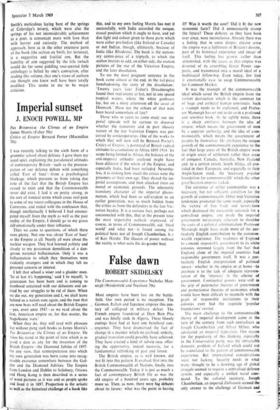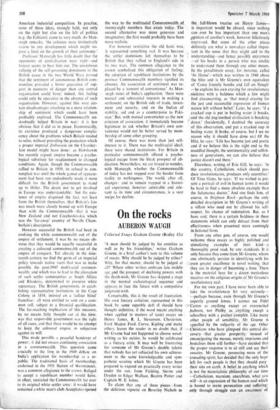False dawn
ROBERT SKIDELSKY
The Commonwealth Experience Nicholas Man- sergh (Weidenfeld and Nicolson 70s) Most empires have been lost on the battle- field. Our own period is no exception. The German, Italian and Japanese empires this cen- tury all collapsed in military defeat. The French empire foundered at Dien Bien Phu and was finally sunk in Algeria. These bloody endings have had at least one beneficial con- sequence. They have dramatised the fact of change in a manner which no civilised, orderly, gradual transition could possibly have achieved. They have created a kind of tabula rasa, offer- ing the opportunity, indeed necessity, for a fundamental rethinking of past and future.
The British empire, as is well known, did not fit into this pattern. It evolved, first into the British Commonwealth of Nations, finally into the Commonwealth. Today it is just as much a fact of contemporary British life as was the old empire of a hundred years ago, probably more so. Then, as now, there were big debates about its future: what was the point in having it? Was it worth the cost? Did- it fit the new economic facts? Did it unnecessarily cramp
the future? These debates, as they have been ever since, were inconclusive. Already there was a feeling that in some deeper, elusive sense
the empire was a fulfilment of Britain's destiny, part of its historical experience and image of itself. This feeling has grown, rather than diminished, with the years, as that empire was divested of its crumbling Great Power sup- ports, and transmuted into a moral ideal of a multiracial fellowship. Even today, few find it emotionally easy to swap Commonwealth for Common Market.
It was the triumph of the commonwealth ideal which saved the British empire from the
violent destruction which is the common lot of huge and artificial human constructs. Such a triumph needs to be explained, and Profes- sor Mansergh has set out to do so in a profound and sensitive book. As he rightly notes, there is a sharp antithesis between the idea of empire, which means the government of men by a superior authority, and the idea of com- monwealth, which means the government of peoples by themselves He attributes the unique growth of the commonwealth experience to the fact that large areas of the British empire were in origin areas of settlement rather than areas of conquest. Canada, Australia, New Zealand and, to a certain extent, South Africa, all pro- vided. in their European, and especially in their Anglo-Saxon stock, the 'necessary popular foundation for commonwealth' which the other greattwestern empires kicked.
The existence of settler communities was a necessary, but not sufficient, condition for the growth of commonwealth. Other mid-Victorian tendencies promoted the same result, especially the victory of free trade and laissez-faire which destroyed the mercantile rationale for a centralised empire, and made the imperial government increasingly reluctant to shoulder the costs of a colonial administration. Professor Mansergh might have made more of the par- ticularly English contribution to the common- wealth experience. The readiness of England to concede responsible government to its white colonies stemmed largely from the fact that England alone of the imperial countries had responsible government itself. It was a par- ticularly English interpretation of political unrest—whether in the empire or at home—to attribute it to the lack of adequate represen- tation of the 'interests' in the scheme of government. Continental powers were 'still in the grip of paternalist theories of government and protectionist theories of economics whisk would have been difficult to reconcile with the grant of responsible institutions to their colonies even had the requisite 'popular foundations' existed.
The main challenge to the commonwealth theory of imperial development came at the turn Of the century from such centralisers as Joseph Chamberlain and Alfred Milner, who advocated an imperial federation. One reason for the popularity of this thinking, especially in the Conservative party, was the intractable domestic problem of Ireland which could not be assimilated to the pattern of commonwealth experience. But international considerations were not lacking. Security needs in what many thought to be a dawning age of global struggle seemed to require a centralised defence system, and especially a unified naval com- mand. To the colonial secretary, Joseph Chamberlain, an imperial Zollverein seemed tbe only answer to the challenge of German and American industrial competition. In practice, none of these ideas, strongly held, not only on the right but also on the left of politics (e.g. the Fabians), came to very much. As Man- sergh remarks, 'the colonies were instinctively averse to any development which might im- pose a limit on the growth of their autonomy.'
Professor Mansergh has little doubt that the opponents of centralisation were right—and history seems to bear him out. The unanimous rallying of the self-governing dominions to the British cause in the two World Wars proved that the sentiment of autonomous British com- munities provided a better guarantee of sup- port in moments of danger than any central organisation. could have; indeed, this feeling could only be operative in the absence of such organisation. However, against this were cer- tain disadvantages attaching to a mere relation- ship of sentiment which could have been profitably explored. The Commonwealth un- doubtedly helped Britain in war: it is less obvious that it did so in peace. Economically, its existence produced a dangerous compla: cency about the problems which Britain needed to solve, without providing the protection which a proper imperial Zollverein on the Chamber- lain model might have done: as Hobsbawm has recently argued, empire became a psycho- logical substitute for readjustment to changed conditions. Again, though the Commonwealth rallied to Britain in 1939, its refusal to con- template war until the whole gamut of appease- ment had been run undoubtedly made it more difficult for the British government to stand up to Hitler. The desire not to get involved in Europe was understandable: but the exis- tence of empire disguised the fact, not least from the British themselves, that Britain's fate was much more closely bound up with Europe than with the Commonwealth—that it was New Zealand and not Czechoslovakia which was the 'far-away' country of Neville Cham- berlain's description.
However successful the British had been in evolving the white commonwealth out of the empire of settlement, it was by no means ob- vious that they would be equally successful in creating a coloured commonwealth out of the empire of conquest. Yet already in the nine- teenth century we find the germ of an imperial policy towards native races that was to make possible the post-1945 multiracial common- wealth; and which was to lead to the alienation of such settler communities as South Africa and Rhodesia, determined to preserve white supremacy. The British government, in estab- lishing representative institutions in the Cape Colony in 1854, insisted on a 'colour blind' franchise: all were entitled to vote on a com- mon roll, subject to a -financial qualification. The far-reaching implication of this measure, by no, means fully thought out at the time, was that responsible government was the right of all races, and that there would be no attempt to keep the coloured empire in subjection against its will.
This made possible a peaceful handover of power : it did not ensure continuing association in a commonwealth. This question ,came crucially to the fore in the 1949 debate on India's application for membership as a re- public. The traditional basis of membership, enshrined in the 1931 Statute of Westminster, was a common allegiance to the crown. Refufal to accept a republican member would have, in effect, restricted the Commonwealth for ever to its original white settler area: it would have remained a white man's club.Acceptance opened
the way, to the multiracial Commonwealth of twenty-eight members that exists today. The second alternative was more generous and imaginative; the first would probably have been more realistic.
For however restrictive the old basis 'was, it represented something real. It was because the settler doMinions felt themselves to be British that they rallied to England's side in its two wars. The common allegiance to the crown symbolised this obligation of feeling; the adoption of republican institutions by the postwar Commonwealth members signified its absence. An association of sentiment was re- placed by a 'concert of convenience.' As Man- sergh notes of India's application, 'there were mutual and substantial interests in making a settlement, on the British side of trade, invest- ment and security, and on the Indian of stability, aid and as a counterpoise to Paki- stan.' But, with mutual convenience as the new criterion of association, it immediately became legitimate to ask whether Britain's own con- venience would not be better served by mem- bership of some other grouping.
Of course, there was more than just self- interest to it. There was the multiracial ideal; there were shared institutions. For Britain in particular commonwealth offered a psycho- logical escape from the bleak prospect of ab- dication. Nevertheless, we are forced to wonder, with Mansergh, whether the Commonwealth of today has not stepped over the border from reality to nothingness. The world, after all, changes: and to remain trapped in a histori- cal experience, however admirable and rele- vant to its time and circumstances, is a sure recipe for decline.



































 Previous page
Previous page